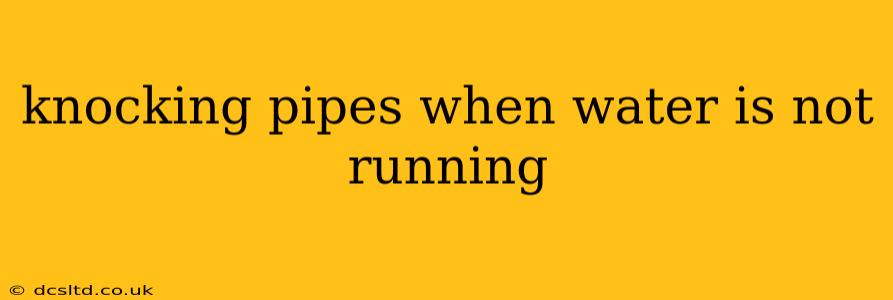Hearing knocking sounds emanating from your pipes when the water isn't running can be unsettling. It's a clear indication that something isn't quite right within your plumbing system. This persistent tapping isn't just annoying; it can also signal potential problems that could escalate into costly repairs if left unaddressed. This comprehensive guide will help you understand the causes of this phenomenon, diagnose the issue, and find effective solutions.
What Causes Pipes to Knock When Water Isn't Running?
The most common culprit behind knocking pipes when the water isn't running is water hammer. This occurs when the flow of water in your pipes suddenly stops. The momentum of the water creates a pressure wave that travels through the pipes, causing them to bang against surrounding structures. However, other factors can contribute to this annoying noise. Let's explore those possibilities.
1. Water Hammer: The Usual Suspect
Water hammer is arguably the most frequent cause. When a faucet or appliance shuts off quickly, the sudden halt in water flow creates a surge of pressure, resulting in that characteristic knocking sound. This is especially common with older plumbing systems that lack proper water hammer arrestors.
2. Loose Pipes and Fittings:
Over time, pipes can shift or fittings can loosen due to vibrations, temperature changes, or settling of the house. This looseness allows the pipes to rattle against surrounding structures when water pressure fluctuates, even when the water isn't actively flowing. These rattling sounds can be easily mistaken for water hammer.
3. Thermal Expansion and Contraction:
Changes in water temperature within your pipes can cause them to expand and contract. If these pipes aren't properly secured, this expansion and contraction can lead to knocking or clanking noises, particularly noticeable during periods of significant temperature fluctuations.
4. High Water Pressure:
Excessive water pressure within your plumbing system can exacerbate the effects of water hammer and other factors contributing to knocking pipes. High pressure can cause pipes to vibrate and rattle against their supports, even in the absence of active water flow.
5. Clogged Pipes:
While less common, a partially clogged pipe can create turbulence and vibrations that manifest as knocking sounds. The reduced water flow can amplify the effects of pressure changes, resulting in noticeable knocking.
How to Diagnose the Source of the Knocking
Pinpointing the exact cause of the knocking requires a systematic approach:
- Listen Carefully: Try to locate the exact area where the knocking is loudest. This will help narrow down the possible problem areas within your plumbing system.
- Check Fixtures: Observe your faucets and appliances closely. Do they shut off quickly or slowly? Quick shutoff often indicates water hammer.
- Inspect Pipes: Look for loose pipes or fittings. Gently tighten any loose connections, but avoid over-tightening.
- Check Water Pressure: Use a water pressure gauge to determine if your water pressure is excessively high. If so, you may need a pressure regulator installed.
How to Fix Knocking Pipes
The solution will depend on the root cause of the problem. Here are some common fixes:
- Install Water Hammer Arrestors: These inexpensive devices are readily available at most hardware stores and effectively absorb the shock waves caused by water hammer. They are typically installed near faucets and appliances.
- Secure Loose Pipes and Fittings: Tighten any loose connections or use pipe straps to secure pipes more firmly to the wall studs or joists.
- Reduce Water Pressure: If your water pressure is excessively high, a pressure regulator can be installed to reduce it to a safe and more comfortable level.
- Clear Clogged Pipes: If you suspect a clogged pipe, you may need to use a drain snake or call a plumber to clear the blockage.
- Replace Damaged Pipes: If you discover any severely damaged or corroded pipes, they'll need replacement to prevent further problems.
What if the knocking continues after trying these solutions?
If you've tried the above solutions and the knocking persists, it's best to call a qualified plumber. They possess the expertise and tools to diagnose and repair more complex plumbing issues, such as internal pipe damage or other underlying problems. Ignoring the problem could lead to more significant and expensive repairs in the future. Don't hesitate to seek professional help if you're unsure about any aspect of the repair process.
Remember, tackling plumbing issues promptly prevents minor problems from turning into major headaches (and expenses!). By following these steps, you can effectively diagnose and resolve the annoying knocking sounds in your pipes, restoring peace and quiet to your home.
